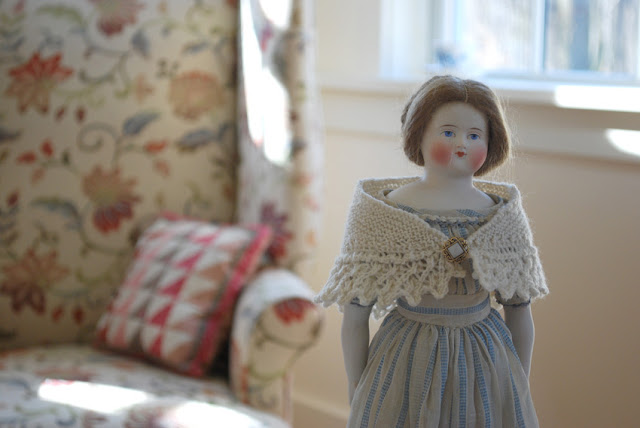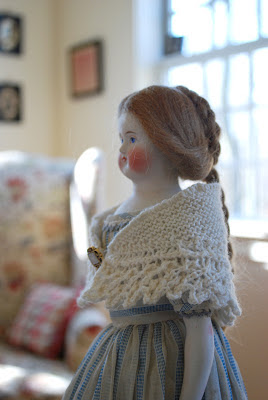I Need You
Helen is wearing her new shawl. I had to put on a thinking-cap (a
knitted one of course) while it took me some days to formulate a pattern with
size 0 needles. Knitting for Helen is the most frivolous thing I’ve done in a
long time.
As this china doll was a
housewarming gift from my sister-in-law I telephoned her with news of my
frivolity. I thought she’d be pleased with the attention I was giving Helen.
At first she didn’t like the sound of it. “Don’t dress and redress her,”
was my sister-in-law’s authoritative remark. “She’s wearing her original muslin
gown, remember? It’s fragile and more than 100 years old.” This came from a
serious antique doll collector who knows her stuff, so I took heed.
“Yes, I’ll be careful,” I said contritely. I won’t handle her too
much.”
She laughed when her stern warning was over, glad after-all that I was
enjoying the company of a fanciful member of the family – even if Helen,
regrettably, must be admired mostly from behind glass.
Seal Morning
The craving to knit the shawl came after watching a favorite film
(again.) (My men folk found other
things to do that evening.) In an early scene of “Seal Morning” Aunt Miriam is
wearing a delicate swallow tale edged lace shawl.
“Seal Morning” takes place in the 1930s
on a seacoast of England. Rowena is orphaned when her parents die in a car
accident. She is sent to live with Aunt Miriam. They meet for the first time –
awkwardly. The cottage is tiny. Aunt Miriam’s income is slight. She works at
painting china at her kitchen table, while at the same table Rowena works
through her lifeless schoolbooks. The cottage is some distance from the nearest
town by pony cart, but Miriam is comfortable living independent of friendship
and welcomes the isolation. She prefers the company of animals to people.
The seal pup Rowena rescues brings a bright spot into the dull days of
Miriam and Rowena. Although we enjoy seeing the beautiful round-eyed seal I
think the story really is about Miriam. She is a plain woman that has some
pretty feminine ways about her in spite of how carefully she guards her
emotions. Not naturally affectionate she softens up a little and grows in her
love for Rowena, eventually confiding in Rowena a piece of her past. A fiancé
broke the engagement. Miriam plans never to be so deeply hurt again.
While walking along the sandy beach and through the lonely marshes,
Rowena meets a biologist who is there to study a species of geese. She invites
him back to the cottage. The biologist, Bernard, has gentlemanly manners. He
and Miriam find that they share common interests. Their love of nature brings
their souls together into a quiet (but very guarded) communion.
I couldn’t help but notice Miriam’s
domesticity. With meager means she keeps her primitive cottage neat and tidy.
Her hands are busy serving with punctuality and care. Linen conceals the rough
table at mealtimes. For tea, little cakes are baked. While balancing a pie on
one hand she trims the crust effortlessly with the other. Either the actress
had practiced insanely much off-camera to make it appear natural, or pies are
second nature to her.
Will Miriam decide that it is okay to need people? Some women resist giving into the soft side of their feminine
natures – especially women today. Although they have remarkable gifts, talents
and strengths, rather than lean on a man, they stubbornly rely on their own
resources and resist giving into their soft side. None of us, however, is meant
to live autonomously.
A Little Boy Lost
Another favorite film of mine is “A Little Boy Lost” with Bing Crosby.
If you like hearing his velvet voice singing “White Christmas” this time of
year as much as I do, you will also enjoy the few songs in this film. But more
so you will be absorbed in the story – that is - once you get passed the
flashbacks that take up a good portion of the first scenes. They provide
important foreshadowing.
This is another story about relationships, lingering hurt, and about
admitting to oneself, “I need you.” When I feel like a good cry I watch this touching film. It is an instant play on line.
Mr. Wainwright is an American radio journalist living in France who
meets a French woman, Lisa. They marry. Soon WWII breaks out and Mr. Wainwright
becomes a war correspondent. Just after Lisa gives birth Mr. Wainwright is sent
on assignment to Dunkirk. Enemy invasion keeps the couple apart. While he works
in England Mr. Wainwright learns that Lisa is killed. The baby – now a little
boy - is lost in the shuffle - like so many children during wartime.
Carrying the dull-ache of his sorrow around with him for
years, he fools himself that he doesn’t need anyone – not even his true friend,
whom he resents for acting as his conscience. Will Mr. Wainwright love,
and trust again? Will he find his son when he travels to an orphanage in France
or will he give up the search when he meets with discouragement?
The Story of Holly & Ivy
The Story of Holly & Ivy by
Rumer Godden is a tale that melts my heart at Christmastime. It is a beautiful book and a beautiful story. You may already
know I am fond of Barbara Cooney’s nostalgic, folk-art illustrations. Although
this children’s story is a bit fanciful to be realistic fiction this is
precisely what makes it so endearing for those of us who believe in miracles.
Ivy is a little orphan girl with a keen imagination and a longing for a
doll of her own for Christmas. She also wishes to live in a quaint town in a
family of her own. Holly is the doll in the red dress displayed in the shop
window wishing for a little girl to play with her (not to be admired behind
glass like my Helen). Childless Mrs. Jones, the policeman’s wife, wishes her
Christmas gift could be a little girl. Reading how all these wishes come true
may bring a tear to your eye.
“However motherhood [or fatherhood] comes to you, it’s a miracle.” Valerie Harper – adoptive parent
Part of the Family
Although the book, Part of the Family is meant to be an encouragement to foster and
adopted children the book quite unexpectedly brought healing to my heart.
Some remarkable people in the Bible were separated from their biological
families. God used their foster care and adoptive families for His purposes. In
these short chapters children will read the story of Moses, Joseph, Samuel,
Esther, Daniel, the Israelite maid in Naaman’s household, Jesus (who had a
stepfather) and others, in a new light.
Losses in our lives can make us feel gloomy, forgotten, unimportant, but God can use losses for blessing. Trusting in His sovereignty we can rise above the seeming injustice in this fallen world with trust and gratitude. It is clear to me that author Merle Burkholder (who has cared for foster children) has compassion for young people struggling with this sensitive topic.
Losses in our lives can make us feel gloomy, forgotten, unimportant, but God can use losses for blessing. Trusting in His sovereignty we can rise above the seeming injustice in this fallen world with trust and gratitude. It is clear to me that author Merle Burkholder (who has cared for foster children) has compassion for young people struggling with this sensitive topic.
I believe Part of the Family will comfort adults, too, with lingering hurt, adults - though not fostered or adopted - were perhaps raised with an unaffectionate stepparent or absentee parent that they need to forgive - or were brought up in an unbelieving household. All Christians, young and old, can take joy that they’ve been adopted into God’s family.
“’Well, now, I’d rather have you than a dozen boys, Anne,’ said Mathew patting her hand. ‘Just mind you that – rather than a dozen boys.’” From Anne of Green Gables
A few Sundays back, in church service, I curiously found these words in the Prayer of Confession. “Dear Heavenly Father, forgive us for living as orphans . . .”
(Romans 8:16)
With courage and humility we can say, “I need you.” In
loving God, serving, trusting, needing Him - and one another - there resides
our source of joy.
Blessings at Christmastime
Comments are welcome,
Karen Andreola
























